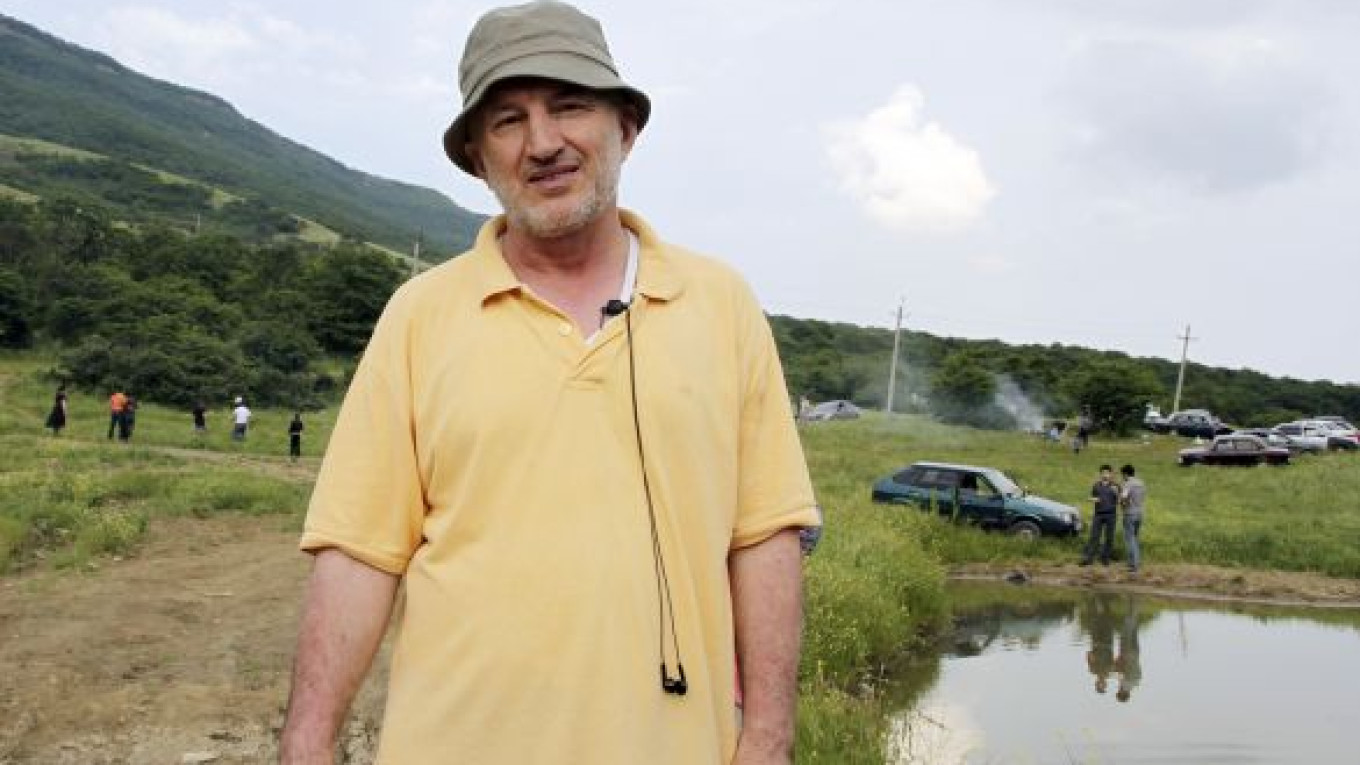A prominent Dagestani journalist was gunned down Tuesday morning near the capital of Makhachkala, likely because of his critical writing on a range of political topics, investigators said.
At 7 a.m. local time, Akhmednabi Akhmednabiyev, 55, a journalist for the weekly Novoye Delo newspaper, was shot and killed in his car by an unknown person in the village of Semender, the Investigative Committee said Tuesday in a statement.
Dagestan is widely seen as the most dangerous part of Russia for journalists to work, with 17 reporters killed there in the last 13 years, including another Novoye Delo reporter, Magomedzagid Varisov, who was shot dead in 2005.
The Investigative Committee's statement said probing the killing of journalists was top priority for the committee, but observers have expressed doubt that Akhmednabiyev's murderers would ever be convicted, saying law enforcement agencies paid no attention to Akhmednabiyev's complaints about the threats he received in the past.
According to one of Akhmednabiyev's colleagues at the paper, Ragimat Adamova, he was constantly threatened by text message, and there was an attempt to kill him earlier this year, but investigators did not acknowledge the incident as a murder attempt at the time and refused to provide Akhmednabiyev with any security.
“In January 2013, Akhmednabiyev was attacked and his car was shot at, but he did not suffer any injuries then. Various versions of what happened [on Tuesday] are being considered by investigative authorities, although the main one is that Akhmednabiyev was killed because of his professional activity,” the Investigative Committee statement said.
Akhmednabiyev was critical of local authorities and law enforcement agencies in his articles. Among the topics that he covered were corruption, violence in Dagestan, and religious issues.
Adamova said Akhmednabiyev's most recent stories focused on the head of his native Akhvakhsky district, Ismail Magomedsharipov, whom he subjected to harsh criticism in his writing.
Novoye Delo, established in the early 1990s, is highly respected among Dagestani residents. Enver Kisriyev, a Caucasus expert with the Russian Academy of Sciences, said Novoye Delo was one of the best papers in Dagestan, with a sharp political attitude, and that it was very critical of authorities.
According to Kisriyev, who knew Akhmednabiyev personally, Akhmednabiyev was on a so-called “hit list” along with eight other Dagestani journalists, some of whom have also been killed, including Khadzhimurat Kamalov, head of another popular Dagestani newspaper, Chernovik. Kamalov was murdered in 2011.
Authors of the hit list, distributed throughout Makhachkala in 2009, threatened revenge for killings of police officers. The authors were never discovered, but Kisriyev said there were suspicions that the list was made by relatives of Dagestani police officers killed by members of extremist religious groups.
Akhmednabiyev was on the list because he was critical of law enforcement authorities in his articles, Kisriyev said, but people who made the list likely considered him part of a religious group as well because he often defended Dagestan's Muslim population.
“He wasn't afraid of the topic and was very definitive in his approach, and he wasn't afraid of the threats that he received,” said Kisriyev.
Kisriyev also said despite some freedom of speech in the region, papers including Novoye Delo are being pressured by authorities with lawsuits and attempts to close them down. In addition, not a single case of a killing of a journalist in Dagestan has ever been uncovered, Kisriyev said.
“Control of law enforcement authorities in Dagestan is harsh; not a single case was ever fully uncovered. Most likely, the reason for that is that criminals have backers in law enforcement agencies,” he said.
According to Adamova, Akhmednabiyev was meant to participate in a court hearing Wednesday to consider his complaint that investigators didn't open a criminal case into the murder attempt against him in January.
A spokesperson for the Dagestani branch of the Investigative Committee said several killings of journalists in the region had in fact been solved. The spokesperson told the Moscow Times that three murders of 12 investigated by the committee since 2000 had led to convictions, including the murder of Czech journalist Martin Kraus, who was killed in 2003.
The spokesman said most of the cases were closed because the alleged murderers — who are most often Dagestani guerillas — were killed during raids by special forces. But Kisriyev said confirmations of such killings were issued only in order to conceal who the real murderers were.
Such high-profile cases as the murder of Novaya Gazeta reporter Anna Politkovskaya and Russian Forbes editor-in-chief Paul Khlebnikov, both of which occurred in Moscow, remain unsolved, as does the attack on former Kommersant reporter Oleg Kashin.
According to the Committee to Protect Journalists, a U.S.-based non-governmental organization, Russia is the world's ninth most dangerous country for journalists to work in.
The head of the Russian Union of Journalists, Vsevolod Bogdanov, said last November that some 340 journalists had been killed in Russia since 1990, with only 20 percent of cases investigated.
Contact the author at e.kravtsova@imedia.ru
A Message from The Moscow Times:
Dear readers,
We are facing unprecedented challenges. Russia's Prosecutor General's Office has designated The Moscow Times as an "undesirable" organization, criminalizing our work and putting our staff at risk of prosecution. This follows our earlier unjust labeling as a "foreign agent."
These actions are direct attempts to silence independent journalism in Russia. The authorities claim our work "discredits the decisions of the Russian leadership." We see things differently: we strive to provide accurate, unbiased reporting on Russia.
We, the journalists of The Moscow Times, refuse to be silenced. But to continue our work, we need your help.
Your support, no matter how small, makes a world of difference. If you can, please support us monthly starting from just $2. It's quick to set up, and every contribution makes a significant impact.
By supporting The Moscow Times, you're defending open, independent journalism in the face of repression. Thank you for standing with us.
Remind me later.


